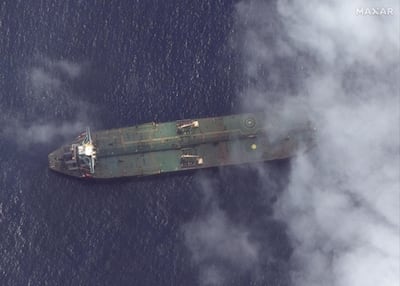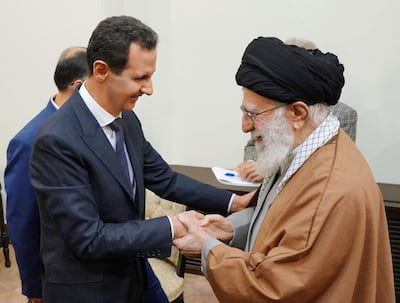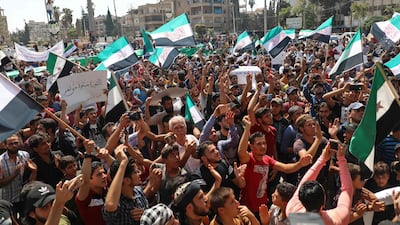In the ongoing saga over the Iranian oil tanker Grace 1, the outcome of the stand-off surprised few people. Earlier this week news reports said the tanker carrying two million barrels of crude from Iran and suspected to be heading to Syria, flouting EU sanctions, had unloaded its cargo in the port of Tartus, despite assurances by Tehran that it intended to do no such thing. The US and UK reacted angrily this week to satellite images showing the tanker approaching a port in Syria, with British foreign secretary Dominic Raab issuing a statement saying it was "now clear that Iran has breached these assurances and that the oil has been transferred to Syria and Assad's murderous regime", adding the move was an "unacceptable violation of international norms".
The episode has brought into stark relief once again Iran’s destructive role in Syria, in support of a dictator who starves his own people. Tehran’s foreign policy highlights the need to address its behaviour in the region as part of a grand rapprochement with Iran’s rivals in the Middle East and the West.
British Royal Marines first impounded Grace 1 in July and the tanker was held in Gibraltar amid suspicions it was heading to Syria in violation of EU sanctions. The episode fuelled a spate of incidents and disruption of shipping channels in the Arabian Gulf that threatened to spiral out of control, raising tensions at a time when European powers were still trying to salvage the 2015 nuclear deal with Iran.
Gibraltar, an overseas British territory, eventually decided to release the ship after Tehran promised it would not send the valuable cargo to Syria, where the Assad regime, which presided over the killing of half a million Syrians and the displacement of half the country’s population, continues to be affected by fuel shortages, despite claiming a military victory against the opposition. The fuel shortages have badly affected ordinary civilians and raised doubts about the regime’s ability to restore normality to a shattered country and reprise its role as a state.

When Grace 1 was pictured off the coast of Tartus, the Iranian foreign ministry said it had offloaded its cargo, although it refused to confirm where it had been delivered.
The shipment is part of Tehran's long-standing alliance with the Assad regime, which has continued regardless of the Syrian government's well-documented brutality. In 2006, at the height of anti-American and anti-Israeli sentiment in the region, Iran's leaders, including the former president Mahmoud Ahmadinejad, enjoyed broad popular support there. This sentiment peaked after the Israeli campaign against Hezbollah in Lebanon, despite the enormous cost paid by Lebanese civilians. Tehran at the time was perceived as being at the vanguard of the fight against Israeli transgression in the region.
Fast forward to 2019, where Tehran is one of the prime backers of a tyrannical regime that has visited atrocities of incalculable scale, including chemical weapons attacks, on its own citizens. It has laid siege to starving civilians, vowing to burn the country in pursuit of the singular goal of maintaining the Assad family’s rule over the shattered remains of Syria.
Iran and its proxy Hezbollah are partners and enablers of the Syrian regime’s war crimes and have themselves carried out sieges and campaigns that aimed to crush opponents of Bashar Al Assad’s dynasty. Hezbollah conducted the siege of Madaya, a town near the Lebanese border, whose inhabitants were forced to eat leaves and grass so they didn’t starve to death. Militias led and backed by Tehran carried out many atrocities in the war, including spearheading the ground assault on the eastern half of the city of Aleppo, carrying out summary executions, looting and other abuses.
I remember a conversation with an official with knowledge of the surrender talks in Aleppo at the time, when Russia was negotiating an end to the fighting in exchange for the forced displacement of tens of thousands of civilians there. The official said he felt that “the Iranians just want to raze Aleppo to the ground”.
While Moscow's intervention is what turned the tide of the war in Syria in Mr Al Assad's favour, the Iranians have been backers of the regime from very early on in the conflict. After initially sending advisers, Tehran propped up Mr Al Assad by extending credit lines that amount to tens of billions of dollars over the years, backing that became easier to furnish as Iran benefited from sanctions relief after the nuclear deal struck with the Obama administration.

In addition to sending operatives, Iran commanded its militias in Iraq and Lebanon to fight alongside the Assad regime, even sending impoverished Afghan refugees to fight with promises of benefits and status in the country. The participation of Iranian-backed militias further inflamed sectarian tensions that took hold in Syria. Many of these militias adopted overtly sectarian identities or symbols and participated in the forced displacement of civilians from opposition-controlled territories that surrendered to the Assad regime, presiding over demographic change meant to cement the stability of rebellious parts of the country.
Iran has sought to reap the rewards of this support for the Assad regime. In addition to cultivating ties with local communities and notables, a grassroots, long-term strategy of consolidating power, it has sought to secure a portion of the lucrative reconstruction pie and other contracts in the country, in addition to seeking influence with security forces, a goal that puts it in conflict with its Russian ally.
It has also sought to build a supply route that spans its territory all the way to the Mediterranean through Iraq and Syria, and improve its strategic position in the region by building up its presence along another front with Israel – abutting the Israeli-occupied Golan Heights – as insurance in the event of a future war.
Ultimately, Iran seeks to project its influence in the region by weakening the Syrian state. In Syria, this strategy has exposed Tehran’s opportunistic foreign policy. The reality is that Iran’s leaders, who claim to resist American hegemony, injustice and oppression, threw their full-throated support behind a totalitarian dictator, damning the dreams of Syrian citizens for freedom.
It is wise to de-escalate tensions in the region. No one wants a war. But the pursuit of a long-lasting easing of the confrontations between Iran and regional and world powers must take into account actions that have provoked instability in Syria and that have subsequently reverberated around the world. Tehran's support for Mr Al Assad has destabilised the region and helped provoke the refugee crisis that has transformed global politics. Sustainable peace can only happen as part of a grand bargain, part of which, by necessity, must include an end of its support for Syria's regime.


